新概念英语第二册Lesson67课
新概念英语第二册67课完整版

•
• •
• • •
alive adj. 活着的 alive 做定语时一定要放在被修饰词后面, 属于 表语形容词,做后置定语 Every man alive has his/her own troubles. live adj. 现场的,活着的(通常只用于动物, 不和人连用) 现场演唱会 live concert 修饰人,意思是“生气勃勃的”He is a live teacher.
• He noticed that a river of liquid rock was coming towards him. It threatened to surround him completely, but Tazieff managed to escape just in time. He waited until the volcano became quiet and he was able to return two days later. This time, he managed to climb into the mouth of Kituro so that he could take photographs and measure temperatures. Tazieff has often risked his life in this way. He has been able to tell us more about active volcanoes than any man alive.
active • 1) adj. 活动的,活跃的 • an active member of the club • 2) adj. 积极的;主动的 • an active learner take active steps active vioce take an active part in the activities 反义词 passive adj. 消极的, 被动的 an passive learner passive vioce actor; actress; action; actively
新概念2 第67课
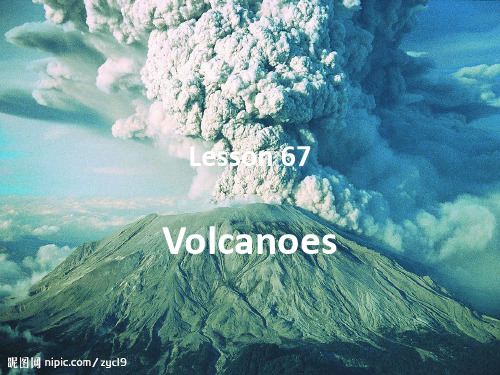
.
• Observe • 1)v. 观察,观测,注意看 • 注意看我怎样做 (这件事)
• Observe how I do this [how to do this].
• 2)v. 遵守<规则等>; 保持 • 遵守交通规则
• observe the traffic regulations
.
• Set up 竖立,架起;创立,建 立
• 他们竖起一些石头当界碑。
• They set up some stones as land marks.
• 在他17岁的时候就创立了一家公 司。
• He set up a company when he is only 17 years old..
.
• a river of… ……形成的河流 • a river of soil and stone • 泥石流 • 在二战中,血流成河。 • Rivers of blood flowed during World war II. • 当她听说了这个消息,眼泪如河水般从她脸上
• close to 离……很近,与……靠 近
• 他把车停到靠近河边的地方。 • He parked the car close to the
river. • 不要坐的离火太近。 • Don’t sit so close to the fire.
.
• Manage to do sth 设法做成某事
punished. • ② n. 逃脱 • narrow escape 九死一生 • 今年我们有三起越狱事件 • We had three escapes from the prison
新概念英语第二册第67课 volcanoes

alive asleep alike ahead awake alone
单词学习
• • • • • • • • • • • • volcano active Kivu Congo Kituro erupt violently manage brilliant liquid escape alive
Lesson 67
Volcanoes
活火山
active volcano
休眠火山
dormant volcano
死火山(extinct volcano)
海底火山
Submarine volcano
基伍湖 Kivu
刚果 Congo
基图罗火山 Kituro
单词学习
• • • • • • • • • • • • volcano active Kivu Congo Kituro erupt violently manage brilliant liquid escape alive
manage v. 设法 manage to do sth. = succeed in doing sth.=be able to do sth. 设法做成某事 我总算下了车. I managed to get off the bus. 那栋房子你最后找到了没有? Did you manage to find the house? management n. 管理,经营 manager 经理 manageress 女经理
• alive(后定,表) • Every man alive has his/her own troubles.
alive adj. 活着的
• live adj. 现场的,活着的(不和人连用) • 现场演唱会 live concert • 活鱼 live fish • living 活着的(定,表) • living things /people • make a living
新概念第二册Lesson67课件(共16张PPT)
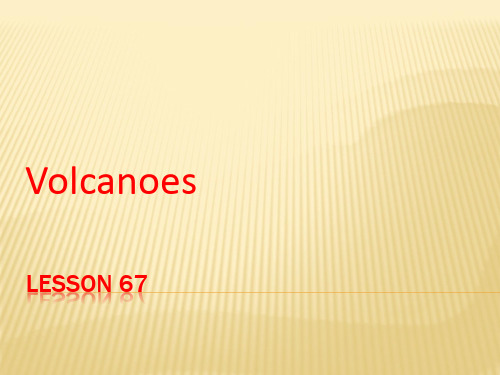
★active 1) adj. 活动的,活跃的 活火山
an active volcano 市况活跃
The market is active. 2) adj. 积极的 反义词 passive adj. 消极的, 被动的 公司需要采取积极措施以增加出口。
Companies need to take active steps to increase exports.
花多少时间干……
她用太多时间装扮自己
She spends too much time (in) dressing herself.
lifetime n. 毕生精力
spend one’s lifetime 花了某人毕生精力
in all parts of the world 世界各地的
Volcanoes
LESSON 67
单词学习ቤተ መጻሕፍቲ ባይዱ
volcano active Kivu Congo Kituro erupt violently manage brilliant liquid escape alive
n. 火山 adj. 活动的 n. 基伍湖 n. 刚果 n. 基图罗 v. (火山)喷发 adv. 猛烈地,剧烈地 v. 设法 adj. 精彩的 adj. 液态的;n. 液体 v. 逃脱 adj. 活着的
★escape ① vt. 逃脱 escape sth. 死里逃生
escape death escape doing sth. 逃脱做某事 他逃过了惩罚。
新概念英语二册 67
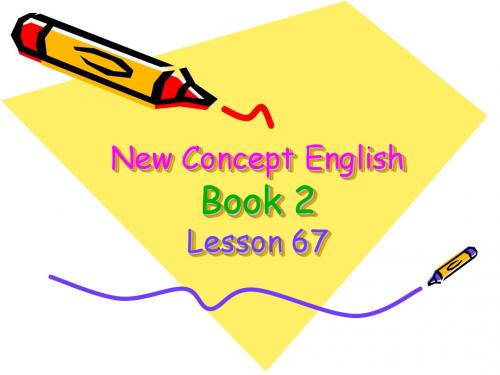
4. to escape just in time in time..表明”及时”
I caught the train just in time.
Key points 学习要点
5. He has been able to tell us more about active volcanoes than any man alive.
Words/phrases 单词与词组
一生 活火山 在世界各地 能够去做… 威胁 包围 及时 量温度 冒着生命危险
1. Haroun Tazieff has spent his lifetime studying active volcanoes and deep caves. spend time/money (in) doing sth… The Smith has spent a lot of time and money building the new house. 2. to set up his camp very close to the volcano, close to…为副词,表 “接近地, 紧密地” Don’t sit too close to the fire.
Words/phrases 单词与词组
n. 火山 j. 活动的 n. 基伍湖 n. 刚果 n. 基图罗 v. (火山)喷发 adv. 猛烈地,剧烈地 v. 设法 adj. 精彩的 adj. 液态的 v. 逃脱 adj. 活着的 adj. 波兰的 v. 观察
Words/phrases 单词与词组
be able to 表示 “能够”, 将来时: will be able to… 当表示成功地完成过去某个动作时, 用 was able to… 1) Jane can’t swim, but she will be able to swim in a few months. 2) The plane was able to rise up after two heavy bags had been thrown out.
新概念英语第二册 Lesson67

• ①notice sth. • ②notice sb. do 注意到某人做某事 • ③notice sb. doing 注意到某人正在做某事 • ④notice that + 宾语从句 • 我们不用notice that这个句型,可改为—
• He notice a river of liquid rock coming towards
• He escape being punished.
• 他逃避了被惩罚的命运
• ★alive adj 活着的
• 以字母a开头的形容词往往是表语形容词,表 语形容词做定语时,一定要放在被修饰词后面。 如: 前面的灯光light ahead。
• 表示活着的什么东西,一定是sth. alive.如果想 放在被修饰词的前面,用living。living为定语 形容词。living sth.
eruption [I‘rʌpʃən] n. 爆发
Words and expressions:
violent adj.激烈的
The earthquake was extremely violent.
violently adv. 激烈地,猛烈地 violence n.暴力
There is too much violence on TV.
• ★manage v 设法 • ①manage to do 设法做某事
• = try to do sth. • = succeed in doing sth. • I try to pass the exam.
• 我尽力通过考试(结果不知道)
• I manage to pass the exam.
益处:地热、温泉 、制造陆地 、地球天然的气候调整机制
新概念英语第二册Lesson67~69课文注释
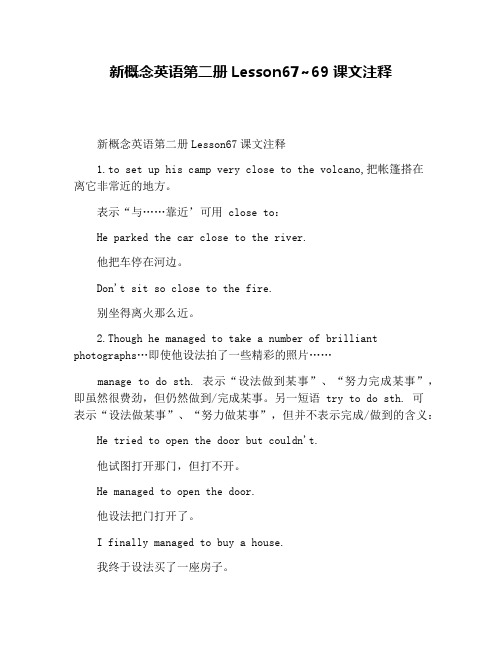
新概念英语第二册Lesson67~69课文注释新概念英语第二册Lesson67课文注释1.to set up his camp very close to the volcano,把帐篷搭在离它非常近的地方。
表示“与……靠近’可用 close to:He parked the car close to the river.他把车停在河边。
Don't sit so close to the fire.别坐得离火那么近。
2.Though he managed to take a number of brilliant photographs…即使他设法拍了一些精彩的照片……manage to do sth. 表示“设法做到某事”、“努力完成某事”,即虽然很费劲,但仍然做到/完成某事。
另一短语 try to do sth. 可表示“设法做某事”、“努力做某事”,但并不表示完成/做到的含义:He tried to open the door but couldn't.他试图打开那门,但打不开。
He managed to open the door.他设法把门打开了。
I finally managed to buy a house.我终于设法买了一座房子。
3.a river of liquid rock,一股岩浆。
river在这里为比喻用法,表示“(……的)巨流”。
因为 a river of 这个结构中没有 as, like等明确表示“像”的词,所以,它是一种暗喻。
When she heard the news, a river of tears came down her face.她听到这个消息后,泪如泉涌。
Rivers of blood flowed during World war Ⅱ.第二次世界大战期间血流成河。
4.It threatened to surround him completely…(岩浆)眼看就要将他团团围住……threaten表示“威胁着要”、“恐吓”:The forest fire threatened to destroy the town.森林大火眼看就要将这个镇子焚毁。
新概念英语第二册Lesson67 Volcanoes课件(共29张PPT)
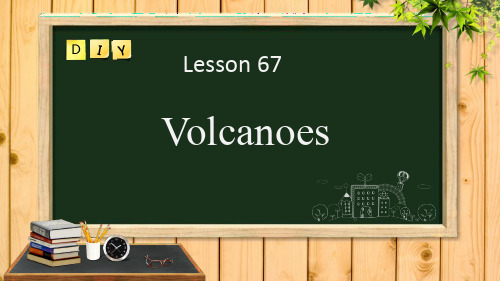
Spend time (in) doing sth 花费时间做某事,in可省略 -今天我花了三个小时打扫房间。
=All over the world =All around the world
In 1948, he went to Lake Kivu in the Congo to observe a
An active volcano has erupted recently 一座活火山最近喷发了。
Violently [ˈvaɪələntli] adv. 猛烈地, 激烈地
Her heart was beating violently. 她的心猛烈地跳动着。
manage ['mænɪdʒ]
vt. 设法
In time 及时,适时 On time 准时
He waited until the volcano became quiet and he was
able to return two days later. 他等到火山平静下来,两天以后又返回去。
否定形式
现在的能力 can not
将来的能力 will/shall not be able to
Volcano eruption 火山喷发
Active [‘æktɪv] adj. 积极的;活跃的;活动的
We should play an active role in school activity. 我们都应该在学校活动中扮演更积极的角色。
Each musician is an active member of the symphony. 每个音乐家都是交响乐中活跃的一个分子。
n.逃脱,逃避的方法
For me television is an escape. 但对我而言,电视是个逃避现实的方法。
新概念英语二册lesson67课件
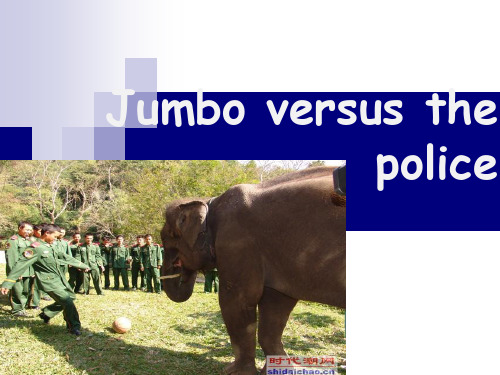
2. (第二、三人称)建议 / 劝 告
Henry ought to be here soon. He left home at six.
3. 对现在或将来的(可信的) 推测
4. 客观上难以/不能实现 的愿望
I love summer! It ought to be summer all the year.
riding a baby elephant called Jumbo 过去分词做后置定语
他骑上一头名叫江伯的小象。 He rode a baby elephant called Jumbo. 他沿着城里的主要街道出发了。 He set off down the main street of the city.
Jumbo versus the police
Christmas
Christmas Day Christmas Eve Father Christmas (Santa Claus)
circus
circus
当C大写的时候, 意思为“圆形广场”
Piccadilly Circus 皮卡迪里广场
她一到家就开始准备午饭。
As soon as she got home, she set about preparing lunch.
2)set off/ set off for
The enemy tank truck caught fire and set off a chain of explosions.
circle
present
请归纳present 用法
Yesterday is history; tomorrow is a mystery; but today is a gift. That is why it is called the present.
新概念第二册课文翻译及学习笔记【Lesson67、68、69】
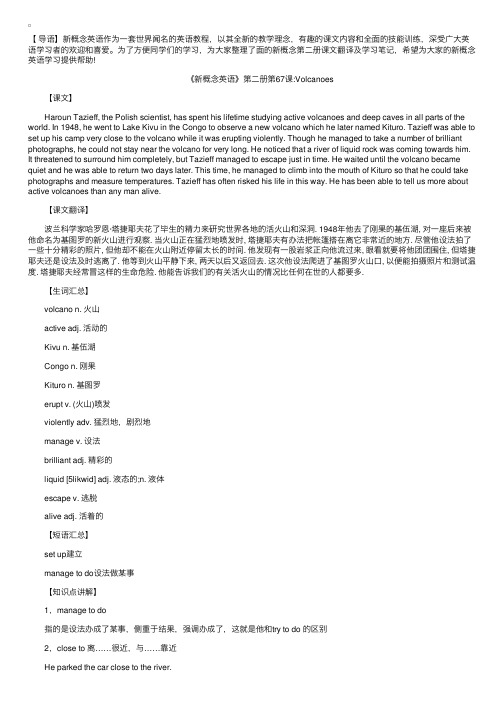
【导语】新概念英语作为⼀套世界闻名的英语教程,以其全新的教学理念,有趣的课⽂内容和全⾯的技能训练,深受⼴⼤英语学习者的欢迎和喜爱。
为了⽅便同学们的学习,为⼤家整理了⾯的新概念第⼆册课⽂翻译及学习笔记,希望为⼤家的新概念英语学习提供帮助!《新概念英语》第⼆册第67课:Volcanoes【课⽂】Haroun Tazieff, the Polish scientist, has spent his lifetime studying active volcanoes and deep caves in all parts of the world. In 1948, he went to Lake Kivu in the Congo to observe a new volcano which he later named Kituro. Tazieff was able to set up his camp very close to the volcano while it was erupting violently. Though he managed to take a number of brilliant photographs, he could not stay near the volcano for very long. He noticed that a river of liquid rock was coming towards him. It threatened to surround him completely, but Tazieff managed to escape just in time. He waited until the volcano became quiet and he was able to return two days later. This time, he managed to climb into the mouth of Kituro so that he could take photographs and measure temperatures. Tazieff has often risked his life in this way. He has been able to tell us more about active volcanoes than any man alive.【课⽂翻译】波兰科学家哈罗恩·塔捷耶夫花了毕⽣的精⼒来研究世界各地的活⽕⼭和深洞. 1948年他去了刚果的基伍湖, 对⼀座后来被他命名为基图罗的新⽕⼭进⾏观察. 当⽕⼭正在猛烈地喷发时, 塔捷耶夫有办法把帐篷搭在离它⾮常近的地⽅. 尽管他设法拍了⼀些⼗分精彩的照⽚, 但他却不能在⽕⼭附近停留太长的时间. 他发现有⼀股岩浆正向他流过来, 眼看就要将他团团围住, 但塔捷耶夫还是设法及时逃离了. 他等到⽕⼭平静下来, 两天以后⼜返回去. 这次他设法爬进了基图罗⽕⼭⼝, 以便能拍摄照⽚和测试温度. 塔捷耶夫经常冒这样的⽣命危险. 他能告诉我们的有关活⽕⼭的情况⽐任何在世的⼈都要多.【⽣词汇总】volcano n. ⽕⼭active adj. 活动的Kivu n. 基伍湖Congo n. 刚果Kituro n. 基图罗erupt v. (⽕⼭)喷发violently adv. 猛烈地,剧烈地manage v. 设法brilliant adj. 精彩的liquid [5likwid] adj. 液态的;n. 液体escape v. 逃脱alive adj. 活着的【短语汇总】set up建⽴manage to do设法做某事【知识点讲解】1,manage to do指的是设法办成了某事,侧重于结果,强调办成了,这就是他和try to do 的区别2,close to 离……很近,与……靠近He parked the car close to the river.Don’t sit so close to the fire.3,risk⽤法汇总risk one’s life 冒着⽣命危险take a risk of… =at a risk of… 冒着……的危险risk sth.=risk losing sth. 冒着失去……的危险risk doing sth. 冒着做……的危险《新概念英语》第⼆册第68课:persistent【课⽂】I crossed the street to avoid meeting him, but he saw me and came running towards me. It was no use pretending that I had not seen him, so I waved to him. I never enjoy meeting Nigel Dykes. He never has anything to do. No matter how busy you are, he always insists on coming with you. I had to think of a way of preventing him from following me around all morning.'Hello, Nigel,' I said. 'Fancy meeting you here!''Hi, Elizabeth,' Nigel answered. 'I was just wondering how to spend the morning -- until I saw you. You're not busy doing anything, are you?''No, not at all,' I answered. 'I'm going to...''Would you mind my coming with you?' he asked, before I had finished speaking.'Not at all,' I lied, 'but I'm going to the dentist.''Then I'll come with you,' he answered. 'There's always plenty to read in the waiting room!’【课⽂翻译】我穿过马路以便避开他, 但他看到我并朝我跑过来. 若再装作没看见他已是没有⽤了, 我只好向他招⼿。
(完整版)新概念英语第二册笔记_第67课

Lesson 67 Volcanoes 火山【Text 】Haroun T azieff, the Polish scientist, has spent his lifetime studying active volcanoes and deep caves in all parts of the world. In 1948, he went to Lake Kivu in the Congo to observe a new volcano which he later named Kituro. Tazieff was able to set up his camp very close to the volcano while it was erupting violently. Though he managed to take a number of brilliant photographs, he could not stay near the volcano for very long. He noticed that a river of liquid rock was coming towards him. It threatened to surround him completely, but T azieff managed to escape just in time. He waited until the volcano became quiet and be was able to return two days later . This time, he managed to climb into the mouth of Kituro so that he could take photographs and measure temperatures. Tazieff has often risked his life in this way. He has been able to tell us more about active volcanoes than any man alive.【课文翻译】波兰科学家哈罗恩·塔捷耶夫花了毕生的精力来研究世界各地的活火山和深洞。
(完整版)新概念英语第二册笔记_第67课

【Text 】 Haroun T azieff, the Polish scientist, has spent his lifetime studying active volcanoes and deep cavesin all parts of the world. In 1948, he went to Lake Kivu in the Congo to observe a new volcano whichhe later n amed Kituro. Tazieff was able to set up his camp very close to the volca no while it waserupti ng viole ntly. Though he man aged to take a nu mber of brillia nt photographs, he could not staynear the volcano for very long. He noticed that a river of liquid rock was coming towards him. Itthreate ned to surro und him completely, but T azieff man aged to escape just in time. He waited un tilthe volca no became quiet and be was able to retur n two days later. This time, he man aged to climb into the mouth of Kituro so that he could take photographs and measure temperatures. Tazieff hasoften risked his life in this way. He has been able to tell us more about active volcanoes than any man alive.【课文翻译】波兰科学家哈罗恩 塔捷耶夫花了毕生的精力来研究世界各地的活火山和深洞。
新概念英语二Lesson67(共26页)

Be Able To
• 能力,技能、技巧 e.g.He is able to sing well • 有能力且成功地做了某事 e.g.Tom was a smart student and he was
spend…(in) doing
• 花费…做某事
• We need to spend more time making our products powerful and easy to use for everyone
• Don’t spend too much money on playing.
alive
• 活着的 • Living • e.g.Are her parents still alive
Does she have any living relatives?
• Live
• lively
observe
• 观察Noun:observation
• 遵守,奉行Noun:observance
• 聪颖的,出色的
• Run away • escaped
escape
• Escape from e.g. They escaped from the burning building.
• 洞穴
cave
• verb: cave in 屈服,妥协 e.g. He finally caved in and agreed to the plan
able to get a good mark every text. • 可用于各种时态 e.g.He will be able to win the game if he
- 1、下载文档前请自行甄别文档内容的完整性,平台不提供额外的编辑、内容补充、找答案等附加服务。
- 2、"仅部分预览"的文档,不可在线预览部分如存在完整性等问题,可反馈申请退款(可完整预览的文档不适用该条件!)。
- 3、如文档侵犯您的权益,请联系客服反馈,我们会尽快为您处理(人工客服工作时间:9:00-18:30)。
3. What did he managed to do when returned to the volanco two days later?
Answers to the questions
• observe (notice, see, look at,watch, read) • 1)v. 观察,观测,注意看 • 注意看我怎样做 (这件事) • Observe how I do this [how to do this]. • 2)v. 遵守<规则等> ( obey) • observe the traffic regulations
Language points 1. Haroun Tazieff, the Polish scientist, has spent
his lifetime studying active volcanoes and deep caves in all parts of the world.
• spend some time (in) doing sth.
• She spends too much time (in) dressing herself. • 她花了太多的时间打扮自己 • lifetime n. 毕生精力
• spend one’s lifetime in…
• in all parts of the world
2.In 1948, he went to Lake Kivu in the Congo to observe a new volcano which he later named Kituro.
3.Tazieff was able to set up his camp very close to the volcano while it was erupting violently.
• set up 竖立,架起;创立,建立 • 他们竖起一些石头当界碑。 • They set up some stones as land marks. • 在他17岁的时候就创立了一家公司。 • He set up a company when he was only 17 . • close to 离……很近,与……靠近 • He parked the car close to the river. (near) • Don’t sit so close to the fire.
alive adj. 活着的 • alive 做定语时一定要放在被修饰词后面, 属于
表语形容词,做后置定语
• Every man alive has his/her own troubles. • live adj. 现场的,活着的(不和人连用) • 现场演唱会
• live concert • living things /people (不和人连用) • make a living
• I noticed a strange man going towards me.
• a river of… ……形成的河流 • a river of soil and stone • 泥石流 • 在二战中,血流成河。
• Rivers of blood flowed during World war II. • 当她听说了这个消息,眼泪如河水般从她脸上
escape (run away) • ① vt. 逃脱 • escape death • escape doing sth. 逃脱做某事 • 他逃过了惩罚。 • He escape punishment/being punished. • ② n. 逃脱 • narrow escape 九死一生 They had three escapes from the prison this year. 越狱事件
3. He managed to climb into the mouth of Kituro so that he could photographs and measure temperatures.
volanco
an active volanco 活火山 a dormant volanco 休眠火山 an extinct volanco 死火山 dance on a volanco 大难将至犹自取乐 sit on a volanco 处境危险 earthquake; flood; typhoon; storm; tornado
Lesson 67
Volcanoes
活火山
active volcano
休眠火山
dormant volcano
基伍湖 Kivu
海底火山
Submarine volcano
刚果 Congo
基图罗火山 Kituro
• volcano • active • Kivu • Congo • Kituro • erupt • violently • manage • brilliant • liquid • escape • alive
active • 1) adj. 活动的,活跃的 • an active member of the club • 2) adj. 积极的;主动的 • an active learner
take active steps active vioce take an active part in the activities 反义词 passive adj. 消极的, 被动的 an passive learner passive vioce actor; actress; action; actively
流下。
• When she heard the news, a river of tears came down her face.
6.It threatened to surround him completely, but Tazieff managed to escape just in time.
manage v. 设法 (manager) • manage to do sth. • = succeed in doing sth.=was able to do sth. • 设法做成某事 • 我能把这件事办好 • I can manage it. • = I can manage it myself. • = I can do it. • 我总算下了车. • I managed to get off the bus. • 那栋房子你最后找到了没有? • Did you manage to find the house?
• She bought a number of eggs at the store. • 我可以给你举出很多理由
• I can give you a number of reasons. • for long=for a long time
5.He noticed that a river of liquid rock was coming towards him.
• notice that + 宾语从句 注意到…… When he took off his hat, I noticed that he was
very bald.
• notice /see/hear /watch sb. do/doing sth. • 注意到某人正在做某事 • 我发觉一个陌生男人正向我走来。
brilliant adj.卓越的;非凡的;精彩的;有才华的;鲜
明的
a brilliant speaker 一位卓越的演说家 a brilliant achievements 非凡的成就 brilliant photos 精彩的照片 a brilliant artist 有才华的艺术家 a brilliant color 鲜艳的颜色
单词学习
n. 火山 adj. 活动的 n. 基伍湖 n. 刚果 n. 基图罗 v. (火山)喷发 adv. 猛烈地,剧烈地 v. 设法 adj. 精彩的 adj. 液态的;n. 液体 v. 逃脱 adj. 活着的
Listen and answer questions
1. Where did Tazieff,the Polish scientist, go in 1948 ? Why did he go there?
violently adv. 猛烈地, 剧烈 • She shook her head violently. • The volcano violently erupted. • violent adj. 猛烈的, 激烈的, 暴力引起的, 强暴
a violent man • violence n. 猛烈, 强烈, 暴力, 暴虐, 暴行, 强 •ቤተ መጻሕፍቲ ባይዱThey threaten me with violence.
Study the text
• Haroun Tazieff, the Polish scientist, has spent his lifetime studying active volcanoes and deep caves in all parts of the world. In 1948, he went to Lake Kivu in the Congo to observe a new volcano which he later named Kituro. Tazieff was able to set up his camp very close to the volcano while it was erupting violently. Though he managed to take a number of brilliant photographs, he could not stay near the volcano for very long.
